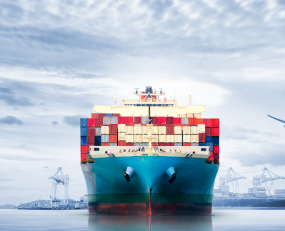
The situation around the Suez Canal and the Red Sea has become quite febrile over the past few days. Several major shipping lines have suspended operations in the area, including BP Shipping and Evergreen.
The Mediterranean Shipping Company (MSC) had already joined Maersk and Hapag Lloyd in suspending sailings around the southern Red Sea due to attacks on ships. In a ‘customer advisory’ statement issued on December 16, the company stated that “on December 15, 2023, the container ship MSC PALATIUM III was attacked at approximately 09.37 UTC while transiting the Red Sea under sub charter to Messina Line. All crew are safe with no reported injuries, meanwhile, the vessel suffered limited fire damage and has been taken out of service. Due to this incident and to protect the lives and safety of our seafarers, until the Red Sea passage is safe, MSC ships will not transit the Suez Canal Eastbound and Westbound. Already now, some services will be rerouted to go via the Cape of Good Hope instead. This disruption will impact the sailing schedules by several days of vessels booked for Suez transit.”
A Maersk ship had a near miss from some sort of projectile on Thursday whilst a Hapag Lloyd vessel was said by anonymous sources in the US Department of Defense to have been hit by a “ballistic missile”. The damage on all the vessels concerned seems to have been limited to small fires and damage to containers.
Over the weekend a Royal Navy warship shot down what was described as a “drone”. By Tuesday 19, the naval situation had escalated, with French, US and British warships engaging a barrage of missiles and drones originating from the coast of Yemen.
It is assumed that these attacks are being made by ‘Houthi’ rebels based in Yemen. They have an alliance with Iran which is suspected of supplying the Houthis with drones and rockets. The motivation for the attacks is very likely to be connected to the war between Hamas and Israel in the Gaza Strip.
The initial response by the shipping lines was, in the words of a Hapag Lloyd spokesman, “to pause and drift outside the strait”. However, the statement from MSC clearly suggests that major lines have decided to avoid using the Suez Canal.
The impact of this is unlikely to be overly serious. Re-routing via the Cape of Good Hope is a viable response to any blockage in the Suez canal, at least for trades serving ports on the Le Havre to Hamburg range. Whilst the ships can increase their speed somewhat, avoiding less important port-calls can have an even greater effect on reducing sailing times. In addition, there is no shortage of vessels on the market to make-up for the effective reduction in capacity caused by the longer sailing times. Inventory availability is also unlikely to be affected seriously, with consignments for the Christmas period already having reached their destinations several weeks ago. The period after Christmas always sees a marked drop in demand and this will likely further ease problems. However, the issue of maritime security in the region is a significant one for Egypt, Saudi Arabia, the UAE and even economies in the Eastern Mediterranean.
Author: Thomas Cullen
Source: Ti Insights
Supply chain strategists can use GSCi – Ti’s online data platform – to identify opportunities for growth, support strategic decisions, help them stay abreast of industry trends and development, as well as understand future impacts on the industry.
Visit GSCI subscription to sign up today or contact Michael Clover for a free demonstration: [email protected] | +44 (0) 1666 519907